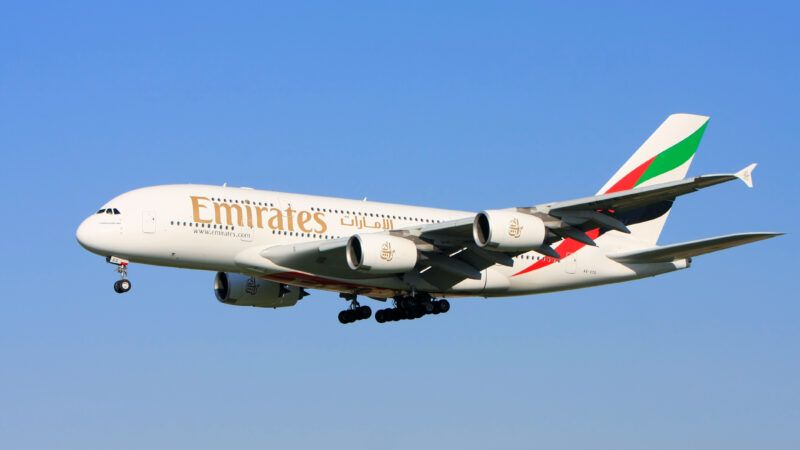You Are Not Free to Move About the Country
For better air travel in the U.S., it’s time for Congress to open the skies to international competition.

The Transportation Department announced a plan this month to discourage airlines from inflicting delays on passengers. The proposal, expected to be released in full later this year, would require airlines to pay customers in cash when their flights are significantly delayed, over and above granting them refunds.
After the operational meltdowns of the 2022 holiday season and amid a widespread sense of a qualitative service decline, the cash compensation idea for tardy departures will surely score President Joe Biden and Transportation Secretary Pete Buttigieg some political points. What it will not do is catalyze the thoroughgoing, durable industry improvement we need. If we want a better air travel experience in the U.S., it's time to open the skies to international competition.
Air cabotage laws stemming from the Civil Aeronautics Act of 1938 ban foreign airlines from operating routes between U.S. airports. An impressive carrier like Japan Airlines can fly from Tokyo Narita to LAX, but it cannot fly passengers from Los Angeles to Seattle, Dallas, or anywhere else within the United States. As a result, U.S. airlines are insulated from the healthy competition that has generated a better air travel experience in other parts of the world.
Despite having the world's highest-revenue domestic air travel market, U.S. domestic flyers are limited to mediocre carriers. The first U.S. airline to appear on the Skytrax global airline rankings, Delta, is all the way down at number 24. According to AirHelp's on-time performance metric—the specific aspect of air travel the Biden plan targets—Delta is again the best domestically, but nine foreign airlines do better.
Rather than add to the complexity of domestic fare pricing with the threat of compelled cash payments, wouldn't U.S. air travelers benefit more from having a wider array of airlines to choose among?
Given the authorization to do so, top global performers such as Singapore Airlines, the Dubai-based Emirates, Japan's All Nippon Airways, and Australia's Qantas could enter the U.S. market to challenge American legacy carriers on the high-revenue routes that link dynamic American regions. Transcontinental domestic flights from New York to Los Angeles and from San Francisco to Washington are enticing assets for premium carriers, and the commercial ties between these cities could be strengthened by welcoming the world's top airlines into the competitive fray. And America's smaller cities could be better connected to the rest of the world if streamlined service were more competitive, connecting them to U.S. hubs and on to international destinations.
At the other end of the market, budget carriers such as Ireland's Ryanair, Britain's EasyJet, and Malaysia's AirAsia provide no-frills travel that could put downward pressure on economy-class fares within the U.S. and give travelers more choice and market power. Economists Xinlong Tan, Clifford Winston, and Jia Yan estimate that the addition of a single European budget airline into the U.S. market would generate $1.6 billion in benefits to American travelers annually.
Cabotage does not apply only to the skies. The Jones Act and the Foreign Dredge Act are two maritime laws that insulate U.S. companies from competition, allow them to stagnate, and deliver consumers little but poor quality and higher costs.
The primary justification for maritime and air cabotage restrictions is that inviting foreign entities into domestic transportation could jeopardize national security. This claim is tenuous in the maritime domain and even less credible in air travel. If anything, easing cabotage restrictions could firm up our links with such key strategic partners as Japan, Australia, and Singapore, affirming rather than undermining security goals.
Keeping foreign airlines off U.S. routes as a rule benefits only the incumbents within the domestic airline industry. As Kevin D. Williamson scathingly remarked after the holiday meltdowns, "The airlines are bad, and their executives are bad—but so are the unions, the airport authorities, the TSA, the FAA, and practically every other major player in the business. There's political corruption, crony capitalism, the usual bureaucratic shenanigans, and, of course, private-sector incompetence."
The Biden administration sees the same thing Williamson and the rest of U.S. air travelers see: our system needs a shake-up. But while the customer compensation plan taps into this charged zeitgeist—and I admit that getting that cash would feel darn good—it will not do nearly enough to alter the industry's course. A more potent, and long overdue, option is for Congress to put genuine market pressure on U.S. legacy carriers by opening up our skies to competition from the best performing and most affordable options the global airline industry has to offer.


Show Comments (77)